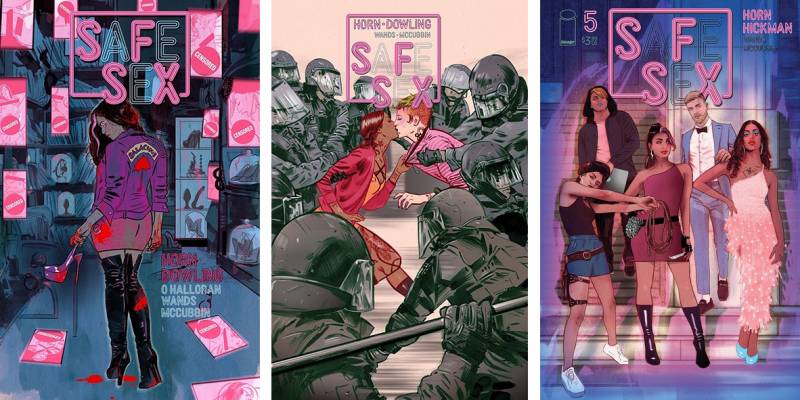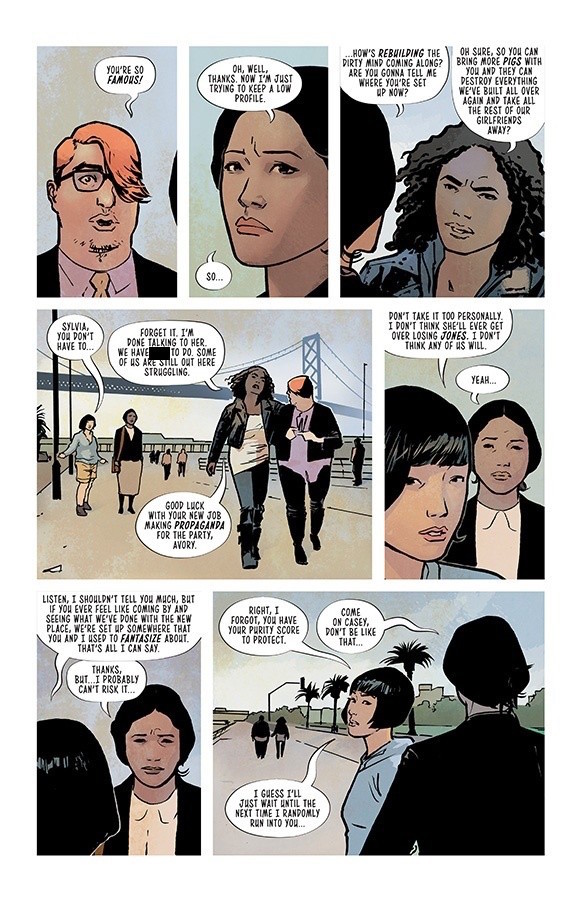A cornucopia of sexual expression oozes from every corner of The Dirty Mind. The building looks strikingly similar to a famed kinky HQ on Mission and 14th Street and is a true haven for San Francisco’s sexual underground. The multi-story, community-run facility includes a dungeon, a dance floor, a bathhouse and an erotic library, with additional space for in-call sex work that’s overseen by a tough but revered and benevolent boss. It’s inclusive, high-tech and everyone is welcome—unless you don’t follow the rules, in which case you’ll be summarily bounced and banned.
San Francisco has been home to facilities resembling aspects of The Dirty Mind for years—but in the comic SFSX (Safe Sex) Vol. 1: Protection, The Dirty Mind is the nexus of a queer, kinky, sex-positive and sex worker-affirming world under attack. Written by Tina Horn in collaboration with a community of queer artists, and published through Image Comics, the seven-issue volume (the first in a trilogy) is an insightful, hilarious and often horrific look at the ways conservative politics, gentrification and fear threaten non-traditional communities—and the way those communities fight back.
“Sex has always been used by the powerful to control the masses through moralizing and much worse,” says Horn, a podcaster, journalist, educator and sex worker rights activist. Horn’s comic explores a not-too-distant future in which the government uses bureaucracy to make sex tedious, and satirizes the way that “a lot of systems that rule modern American life are really bad for people’s libidos.”
“I kind of wanted to build a dystopia around people for whom sexuality is a part of how they express themselves, how they build community, how they make art, how they live their lives [being told that] that their sexuality is dangerous and a threat to the status quo,” Horn adds. “And how a theocratic regime could galvanize people to be like, ‘If you reject sex, we promise we will keep you safe.’”

In SFSX, San Francisco is run by the Party—a savvy, conservative government operating under the guise of feminism. The Party only permits sex during marriage and gives all citizens a “purity score,” broadcasting over its Fox News-esque network that “base urges and drives are for savages, not those who seek to live closer to God while here on Earth.” The comic follows a cadre of unabashed, sex-positive rebels who are sex workers, identify as queer and nonbinary or work for the Party while taking part in the sexual underground at night. After The Dirty Mind is raided and rebranded as the Party’s Pleasure Center HQ, SFSX’s heroes hatch a plan to infiltrate the organization, save their friends and lovers from reeducation programs and get to the bottom of what happens behind closed doors.



